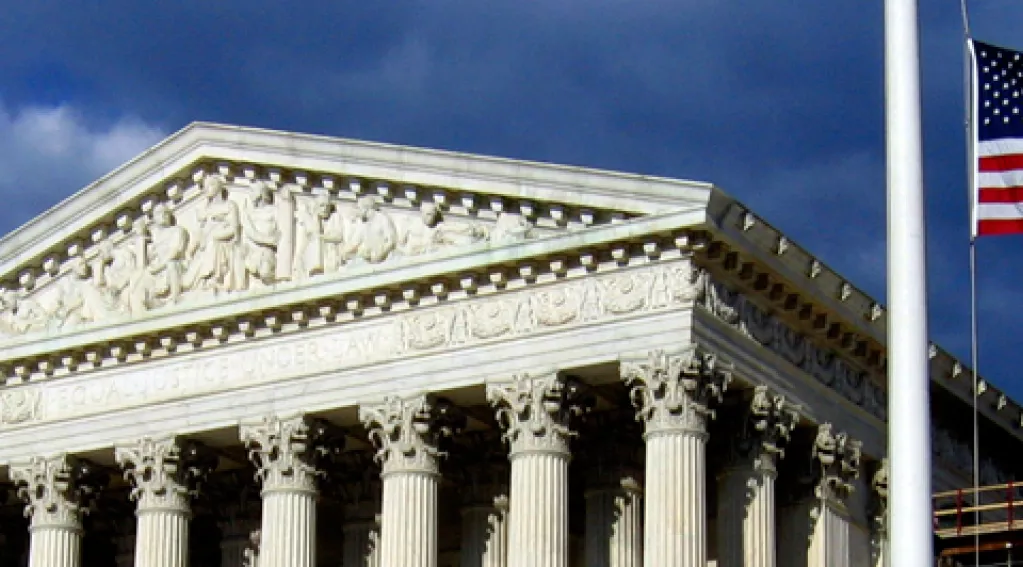U.S. v. Texas Resources

SCOTUS Takes Away Obama’s Pen: Executive Amnesty Injunction Upheld
The Supreme Court dealt a major setback to President Obama’s executive amnesty agenda when it split 4-4 in U.S. v. Texas. The tied vote in the 26 state lawsuit challenging Deferred Action for Parents of Americans (DAPA) and the expansion of Deferred Action for Childhood Arrivals (DACA) means the Fifth Circuit’s injunction stays in place while the case returns to Judge Hanen to be litigated on the merits. Accordingly, the President is prohibited from issuing work authorization to the estimated 5 million illegal aliens who would qualify for DAPA and expanded DACA. As is custom in the rare instance of a split vote, the high court does not include an analysis with the verdict. The entire verdict merely says, “The judgment is affirmed by an equally divided Court.” Last Thursday’s ruling now marks the fifth time the Obama administration has lost in court defending DAPA and expanded DACA: twice before Judge Hanen, twice before the Fifth Circuit, and now before the Supreme Court. read more in today’s legislative update
RELATED…
The Decision: 4–4 Split Vote
ANALYSIS EXCERPTED FROM THE APRIL 12, 2016 FAIR LEGISLATIVE UPDATE
In the event of a tie vote, the lower court’s decision stands. Under this scenario, the Fifth Circuit Court of Appeals ruling in favor of the states will be upheld. Last November, the Fifth Circuit kept in place Judge Hanen’s injunction blocking the implementation of Deferred Action for Parents of Americans (DAPA) and expanded Deferred Action for Childhood Arrivals (DACA). FAIR LEGISLATIVE UPDATE, NOVEMBER 17, 2015
With the injunction still in place, the case will return to Judge Hanen for the parties to litigate the merits of whether President Obama has the authority to unilaterally grant executive amnesty. After Judge Hanen rules on the merits, the case will assuredly be appealed to the Fifth Circuit by the losing party and then appealed again to the Supreme Court. In total, the litigation is expected to last several years before it returns to the Supreme Court and, by that time, Justice Scalia’s vacant seat will be filled.
However, there are other notable implications for a 4-4 vote. A tie vote means there is no Supreme Court precedent. Additionally, the SCOTUS is unlikely to provide an analysis when it rules on the appeal later this year and instead offer a simple statement affirming the lower court’s holding. This is notable because when the high court accepted the case, it specifically asked the parties to brief and argue whether DAPA and expanded DACA “violates the Take Care Clause of the Constitution, Art. II, §3.” FAIR LEGISLATIVE UPDATE, JANUARY 19, 2016
-
Statement by the Federation for American Immigration Reform Regarding Decision by the U.S. Supreme Court in the Case of U.S. v. Texas read the press release
-
Obama Admits He Won’t Deport Illegal Aliens read the blog post
Background
In 2014, President Obama used executive action to grant a de facto amnesty to millions of illegal aliens. Through DAPA and expansion of the DACA program, up to 5 million illegal aliens could not only be protected from deportation, but also be authorized to live and work in the United States, and become eiligible for state-managed public benefits. In response to the president’s unconstitutional actions, 26 states across the country filed a lawsuit in order to prevent these amnesty plans from being executed.
In 2015, a district court judge sided with the state plaintiffs and issued an injunction that blocked the implementation of the executive amnesty; a decision that was later upheld by the Fifth Circuit Court of Appeals.
Get up to speed with United States v. Texas: A Primer.
What’s at Stake?
Get the facts in this new video from FAIR.
FAIR President Dan Stein on the most important case the Supreme Court will decide this year.
When the Supreme Court decides the U.S. v. Texas case, what is at stake is nothing less than the entire premise of more than a century of immigration policy: Namely, the legitimacy of laws that restrict immigration in order to protect the social, economic, and security interests of the American people. read the full article
Recommended Reading from the FAIR Legislative Update
- Congress Has Repeatedly Limited Executive Discretion in Immigration Policy MAY 19, 2016
- Administration to Supreme Court: Crossing Off Words Fixes Amnesty Case APRIL 26, 2016
- Supreme Court Hears Arguments in Executive Amnesty Case APRIL 19, 2016
- 43 Republican Senators File Amicus Brief Opposing Obama’s Executive Amnesty APRIL 12, 2016
- Executive Amnesty Case Arguments Start Soon APRIL 5, 2016
- Administration’s High DACA Approval Rates May Impact Supreme Court Decision APRIL 5, 2016
- House Votes To File Amicus Brief In Landmark Immigration Case MARCH 22, 2016
- House Will File Supreme Court Brief in Executive Amnesty Case MARCH 8, 2016
- Supreme Court to Hear Executive Amnesty Case JANUARY 19, 2016
- Fifth Circuit Thwarts Obama’s Amnesty Programs NOVEMBER 17, 2015
- Judge Threatens Secretary Jeh Johnson with Contempt of Court for Violation of Injunction JULY 14, 2015
- Judge Reprimands Administration Again for Still Defying Court Order JULY 8, 2015
- Citing State Benefits for Illegal Aliens, Appeals Court Upholds Injunction on Executive Amnesty JUNE 2, 2015
- 113 Republicans Go to Court to Oppose Obama’s Executive Amnesty MAY 19, 2015
- DOJ Confesses to Judge DHS Violated Injunction with 2,000 Extended DACA Approvals MAY 12, 2015
- Federal Judge Rebukes Administration; Maintains Hold on Executive Amnesty APRIL 14, 2015
- Federal Judge May Impose Sanctions for Obama Administration Violating Injunction MARCH 24, 2015
- Administration May Launch Executive Amnesty in Some States Despite Injunction MARCH 3, 2015
- Federal Judge Temporarily Blocks Obama’s Executive Amnesty FEBRUARY 18, 2015
- 17 States File Suit to Challenge Executive Amnesty DECEMBER 9, 2014
- President Obama’s Immigration Orders Sweeping in Scope NOVEMBER 24, 2014
